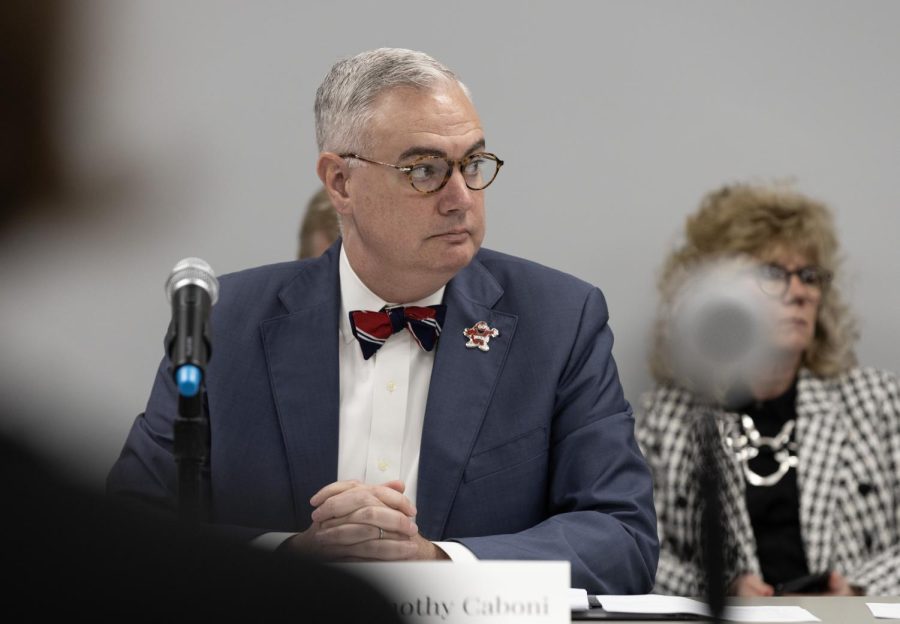Board of Regents approve athletics contracts, administration proposes 3% tuition increase
WKU President Timothy C. Caboni listens to a speaker during the quarterly Board of Regents meeting at the WKU Innovation Campus on Friday, March 3, 2023.
May 4, 2023
Editor’s note: The previous headline stated the Board of Regents proposed a 3% tuition increase, which is incorrect. WKU administration proposed the increase.
The Western Kentucky University Board of Regents discussed athletics contracts, academic program approvals and budgeting plans on Thursday, May 4 at their second quarterly meeting.
To begin the meeting, Provost Bud Fischer presented for approval of various certificates and two program suspensions.
Graduate certificates in enterprise management and in executive decision making were approved by the Board. Undergraduate certificates in sales, executive influence in organizations, managing inclusive organizations and creativity and innovation management were also approved.
WKU President Timothy Caboni and Fischer discussed the rise of certificate programs in higher education as they provide “stackable” credits and credentials for students.
“You think about how our education classes work, how our business classes work, it’s all pressing towards flexibility, stackability [and] modularization,” Caboni said.
The Masters of Fine Arts in folk studies suspension and the Bachelor of Science in agriculture (605) suspension were also approved by the Board.
“It’s [MFA in folk studies] been here for a while and we’re at the point where the enrollment has been low,” Fischer said. “The faculty decided to close it and one of the reasons they decided to close it is that they had lost two people at this point.”
Caboni said confusion had arisen about the agriculture (605) suspension, but said it is not the suspension of the entire agricultural program, just this specific degree path which requires a minor. The Bachelor of Science in agriculture (508) is still available.
The finance and budget committee then presented for approval of filing the Statement of Revenues & Expenditures for the Nine Months report, faculty and staff personnel actions and bond refunding for Honors College and International Center and Downing Student Union renovations. All were approved unanimously.
Also approved was the initiation of capital projects to renovate and maintain various campus facilities, including Gordon Wilson Hall, the Kentucky Museum, Jody Richards Hall, the Center for Research and Development, E.A. Diddle Stadium roof and campus access control.
The final financial action item approved was the 2024-2030 WKU Capital Action Plan for campus construction and renovation.
Caboni moved to amend one portion of this plan, to replace the Academic Complex rather than renovate it. He said with the state of the building, its replacement would be a stronger investment.
“I also took a walk through the building, and investing $90 million on a structure that was built 50 years ago to be a 30 year structure is not a good investment of the scarce resources in the state,” Caboni said.
Susan Howarth, executive vice president for strategy, operations and finance, then presented an information item on the budget development for fiscal year 2024.
The budget includes a 3% tuition increase “in order to cover increasing operational costs,” according to Jace Lux, director of media relations, via email.
The student affairs portion of the meeting included a presentation from the Topper Orientation Program (TOP) leaders as its summer dates approach.
Executive action items featured the approval of two athletic employment contracts for head football coach Tyson Helton and new head basketball coach Steve Lutz.
The finalized contract for Helton now runs through Dec. 31, 2023, with an additional season added to employment following each season the football program wins seven or more games.
The contract for Lutz describes his pay and additional incentives. Both contracts were approved unanimously.
Caboni also presented for the approval of a memorandum of understanding between the College Heights Foundation and WKU, to consolidate the efforts of the College Heights Foundation and the WKU Foundation.
“The College Heights Foundation and the WKU Foundation have worked hard to consolidate their efforts and create efficiencies and essentially have the same investment policy, the same payout policies and that creates an understanding by donors,” Caboni said.
The process began six years ago and both boards chose to merge efforts and “streamline” the investment and donation process. Caboni stated this was first proposed to lessen confusion from donors.
Caboni stated this also places an “arm’s length” between the institution and philanthropic foundations, so that the opinion of the university president does not sway decisions made by the foundations themselves.
“When I entered looking at that organization, I thought it made much more sense for those foundations not to just both work together but also not to report directly to the president, to have that autonomy to make decisions based upon the best interest of the foundation,” Caboni said.
Editor-in-Chief Alexandria Anderson can be reached at alexandria.anderson337@topper.wku.edu.















